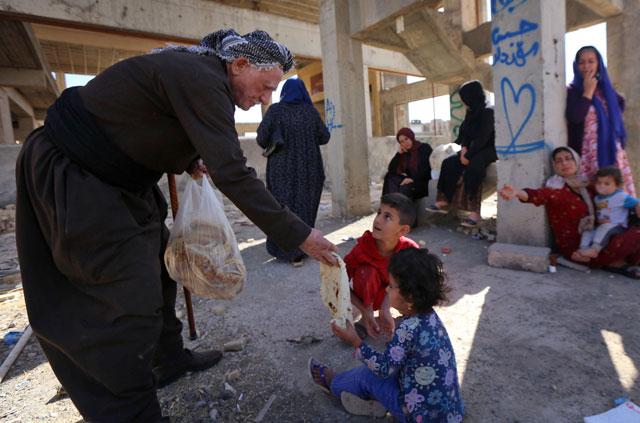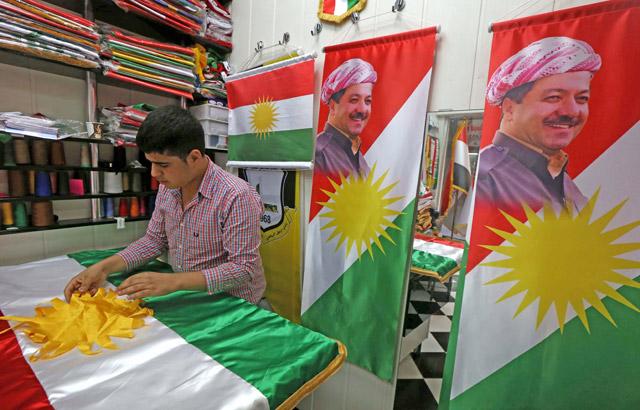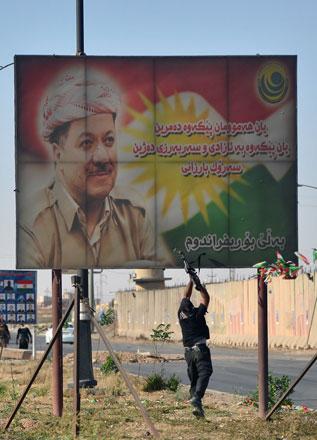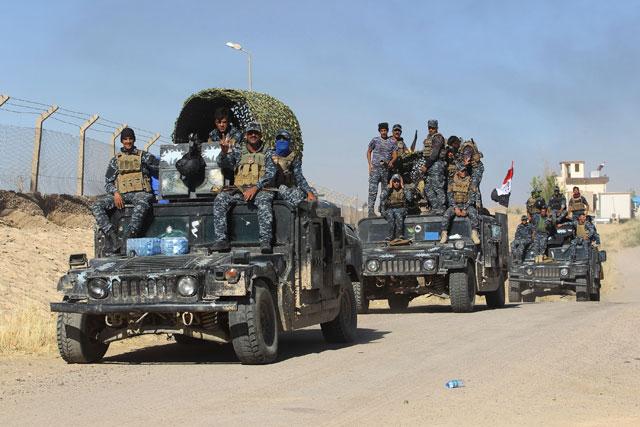You are here
100,000 Kurds flee Kirkuk since Iraqi army takeover — Kurdish officials
By Thomson Reuters Foundation - Oct 19,2017 - Last updated at Oct 19,2017

An Iraqi Kurdish man from Erbil distributes bread to a family fleeing violence in the northern Kirkuk province on Thursday at an unfinished housing project where displaced people are taking shelter in Erbil (AFP photo)
ERBIL, Iraq/BAGHDAD — About 100,000 Kurds have fled the Kirkuk region for fear of persecution since Iraqi armed forces retook disputed territory after a Kurdish independence vote rejected by Baghdad, Kurdish officials said on Thursday.
The United Nations voiced concern at reports that civilians, mainly Kurds, were being driven out of parts of northern Iraq retaken by Iraqi forces and their houses and businesses looted and destroyed, and urged Baghdad to stop any such abuses.
In the first incident of deadly violence, a Kurdish man was killed and six wounded by Iraqi security forces while protesting at the army's takeover of their town, Khanaqin, by Iraqi forces, local Mayor Mohammed Mulla Hassan said.
Kurdish troops had left Khanaqin, near the border with Iran, on Tuesday to avoid clashing with advancing Iraqi forces.
Central government forces swept into Kirkuk, a multi-ethnic city of more than 1 million people and the hub of a major oil-producing area, largely unopposed on Monday after most Kurdish peshmerga forces withdrew rather than fight.
Iraqi forces also took back control of Kirkuk oilfields, effectively halving the amount of output under the direct control of the semi-autonomous Kurdistan Regional Government (KRG) in a serious blow to the Kurds' independence quest.
Baghdad's recovery of Kirkuk, situated just outside the KRG's official boundaries on disputed land claimed by Kurds, ethnic Turkmen and Arabs, put the city's Kurds in fear of attack by Shiite Muslim paramilitaries, known as Popular Mobilisation, assisting government forces' operations in the region.
Nawzad Hadi, governor of Erbil, the KRG capital, told reporters that around 18,000 families from Kirkuk and the town of Tuz Khurmato to the southeast had taken refuge in Erbil and Sulaimaniya, inside KRG territory. A Hadi aide told Reuters the total number of displaced people was about 100,000.
Hemin Hawrami, a top aide to KRG President Masoud Barzani, tweeted that people had fled "looting and sectarian oppression" inflicted by Popular Mobilisation militia.
UN relief officials said they had received allegations that 150 houses had been burned and 11 blown up in Tuz Khurmato and offices of Turkmen political parties in Kirkuk assaulted.
The UN Assistance Mission for Iraq issued a statement urging the Baghdad government "to take every action to halt any violations and ensure all civilians are protected and that the perpetrators of acts of violence, intimidation and forced displacement of civilians be brought to justice".
Khanaqin, mainly populated by Kurds, also lies in long contested territory just outside KRG boundaries.
Iraqi Prime Minister Haider Al Abadi said on Wednesday that security was being maintained in Kirkuk by local police backed by the elite Counterterrorism Service, trained and equipped by the United States mainly to fight Daesh militants. "All other armed group should not be allowed to stay," Abadi said.
Sunni Muslim Kurds comprise the largest community in Kirkuk followed by Sunni and Shiite Muslim Turkmen, Sunni Arabs and Christian Assyrians, according to the Iraqi Planning Ministry.
In another sign of rising tensions, Iraq's Supreme Justice Council ordered the arrest of KRG Vice President Kosrat Rasul for allegedly saying Iraqi troops were "occupying forces" in Kirkuk.
Iran and Turkey joined the Baghdad government in condemning the Iraqi Kurds' September 25 referendum, worried it could worsen regional instability and conflict by spurring their own Kurdish populations to push for homelands. The Kurds' long-time big power ally, the United States, also opposed the vote.
With the referendum having given Abadi a political opening to regain disputed territory and tilt the balance of power in his favour, the KRG Cabinet on Thursday welcomed his call for talks to resolve the crisis.
Abadi had said on Tuesday he considered the referendum "a thing of the past", and asked that the KRG cancel the outcome of the vote as a precondition for negotiations to begin.
In a statement, the KRG Cabinet said, "It will not be possible to resolve the issues through military operations".
KRG peshmerga forces deployed into Kirkuk in 2014 when Iraqi government forces fell apart in the face of a lightning offensive by Daesh insurgents, preventing the oilfields from falling into extremist hands.
Iraqi armed forces also took control of Kurdish-held areas of Nineveh province north of Kirkuk, including the Mosul hydro-electric dam, after the Peshmerga pulled back.
Related Articles
ERBIL, Iraq — Iraq's autonomous Kurdish region on Wednesday announced it would hold a referendum on independence, in a move the central gove
BAGHDAD/KIRKUK — Iraqi government forces captured the Kurdish-held city of Kirkuk on Monday, responding to a Kurdish vote on independence wi
BAGHDAD/KIRKUK — The Baghdad government recaptured territory from Kurds across the breadth of northern Iraq on Tuesday, making startlingly r


















